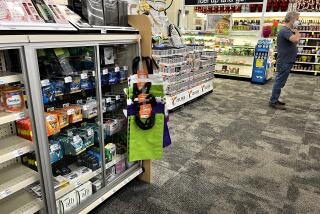Let’s Try Something Tougher: Drive Drunk, Lose the Car
- Share via
People drive drunk without insurance. They even drive drunk without licenses. But they couldn’t very well drive drunk without cars or trucks or motorcycles.
This bit of common sense seems to have a logical conclusion for law enforcement: Separate the drunk from his lethal weapon.
In Los Angeles, Orange, Monterey and Alameda counties, judges have recently signed agreements with a Pacific Grove company to supply ignition-interlock devices to multiple-drunk-driving offenders. As a condition of probation, those convicted must pay $300 for the installation of a unit that affixes a breathalyzer to the steering column. If the operator registers a blood-alcohol content of .04 (.10 is the point of intoxication under California law), the ignition will remain locked for 30 minutes. The first devices should be on the road soon, according to the distributor, Stay-Alive Systems.
The judges are on the right track, though still short of the checkered flag.
The federal government routinely impounds cars, boats and even airplanes seized during the commission of a felony, and auctions them off if their owners are found guilty. Why couldn’t local and state officials do the same when arresting habitual drunk (or drugged) drivers?
For example, police could be empowered to seize on the spot vehicles operated by anyone registering .17 or more blood-alcohol content on a legally administered breathalyzer. Or the driver could be made to automatically forfeit ownership of the car on the third and any subsequent conviction for drunk driving.
But wouldn’t this be a form of summary punishment? Of course it would, which is one of its chief attractions.
Under existing California procedure, police temporarily impound vehicles driven by those cited for drunk driving. A loaded gun taken from a suspect at the scene of a crime is seized as evidence until the charge is adjudicated, and is not returned in the event of conviction.
What if the car does not belong to the driver, or is not paid for?
If the car has not been reported stolen, it would be presumed to be on loan. After it has been auctioned, the rightful owner or the note-holder would be the first in line for compensation--after any innocent victims of an accident involving that car.
Given the obsessive love of Californians for their cars, the seizure of vehicles operated by drunks would have a strong deterrent effect, acting as a kind of sharply progressive tax on those who endanger the lives of others: the bigger or faster or racier the vehicle, the greater the loss.
Friends would be less likely to lend cars, and banks considerably less likely to lend money for car loans, to people who have a drunk-driving conviction under their belt or who have already lost one car to the auction hammer.
Think of the money to be made--and the money to be saved in revolving-door prosecutions, insurance rates and all the other costs that are borne by sober taxpayers.
Obviously we’d be better off if everyone on the road followed the directions on Texas road signs to “Drive Friendly.” In California I’d settle for “Drive Sober. Or Else.”

